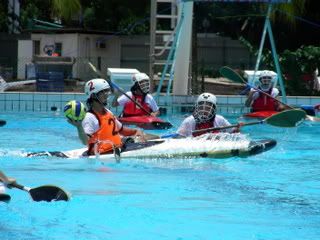


Thank you KATJES for sponsoring us yummy yoghurt gummies for the players to gain some energy during the games!
THANK YOU once again! :D Labels: sponsors
CONTACTS
If you have any enquiries, please feel free to contact the following personnel below:
ABOUT NTU CANOE POLO
Formed in 2001, NTU Canoe Polo is now an established sub club of the Nanyang Technological University (Singapore) Sports Club. The NTU Canoe Polo Team now consists of more than 30 players in action, most of whom started off with no related experience in canoe polo. Since its formation, NTU Canoe Polo has been striving to become the best, pushing to our limits, growing with the team.
The NTU Canoe Polo Team, especially the girls, have been performing well in numerous competitions. In 2008, the NTU Canoe Polo Girls attained the championship title for the Canoe Polo Inter-Varsity-Polytechnic Games, also known as the 1st National Canoe Polo Championships (10th Pesta Sukan Canoe Polo Championships). The guys team has also improved and is now striving to aim for greater heights.
ABOUT THE SPORT

Q. What is canoe polo?
Canoe Polo is a fast and exciting full contact team ball game that combines paddling with ball handling skills. Tactics, team work and positional play are as important as individual skills, as five players per team attempt to play the ball around the pitch in order to score more goals than the opposing team.
Q. How do you play canoe polo?
The players move the ball, equivalent to a water polo ball, around the 35 m by 23 m flat-water pitch by throwing or paddle flicking. The goals are 1.5 m by 1 m rectangular nets suspended 2 m above the water at either end of the pitch. During defensive play, the goalkeeper defends the goal using their paddle held vertically, whilst the other players help to defend or regain possession by using a variety of tactics, such as a ‘zone’ in front of the goalkeeper. During offensive play, the team play the ball around the opposing team’s zone whilst players attempt to make space for a shot at goal.
Q. What is the format of a canoe polo match?
A canoe polo match takes place over two halves of around 10 minutes, with a short half time break. At the start of each half, the players from each team line up along their respective goal lines. The referee starts play and throws the ball into the centre of the pitch, where two players sprint to gain initial possession of the ball. The same happens at the beginning of the second half, and at full time, the winner is the team that have scored more goals than their opponents.
Q. What are the main rules?
The rules of canoe polo look surprisingly complex – however most are technicalities and many more are implemented for safety reasons. * If the ball is played out of the pitch, a sideline throw, goal line throw or corner is given. * Players can only hold the ball for 5 seconds, and then the ball must be dribbled one metre or passed to another player. * Players can be pushed over by a one-handed tackle to the arms or body only if they have possession of the ball. * The paddle cannot be brought within arm’s reach of the player in possession. * Kayak tackles cannot hit the player’s body or ram the player’s kayak at a perpendicular angle. * An opposition player cannot move the goalkeeper, and players are not allowed to obstruct the progress of opposition players along the pitch.
Q. Who controls the game?
A referee on either side of the pitch controls the play by enforcing ICF rules using a whistle and a system of arm symbols. A system of ‘leading and trailing’ is used so that the goal lines can be covered effectively to accurately call goals, goal line throws, corner throws and goalkeeper fouls. The referee should be sufficiently qualified to referee the particular standard of play. In Great Britain, a graded referee assessment scheme is in place (see below). Two timekeepers keep the score, indicate half and full time to the referees and record any cards given by the referees. Additionally, a linesman at either goal line indicate to the referees that both teams are correctly lined up for the start of end period of play, and also check for illegal substitutions. A scrutineer is also required at the start of the competition to check all equipment is safe and legal.
PROUDLY SPONSORED BY:
EVENT DETAILS
January 3, 4, 10, 11 2009
Nanyang Technological University (NTU) Sports and Recreational Centre
0900h - 1800h
OBJECTIVES:
WE ARE LOOKING FOR INTERESTED SPONSORS! :D
We hope that companies will be able to come in as a sponsor in either of the following ways:
In appreciation of your kind sponsorship, we seek to advertise your company’s products and services to the canoe polo community and the public in the following ways:
Please give us your valued support. We await your favourable reply!
